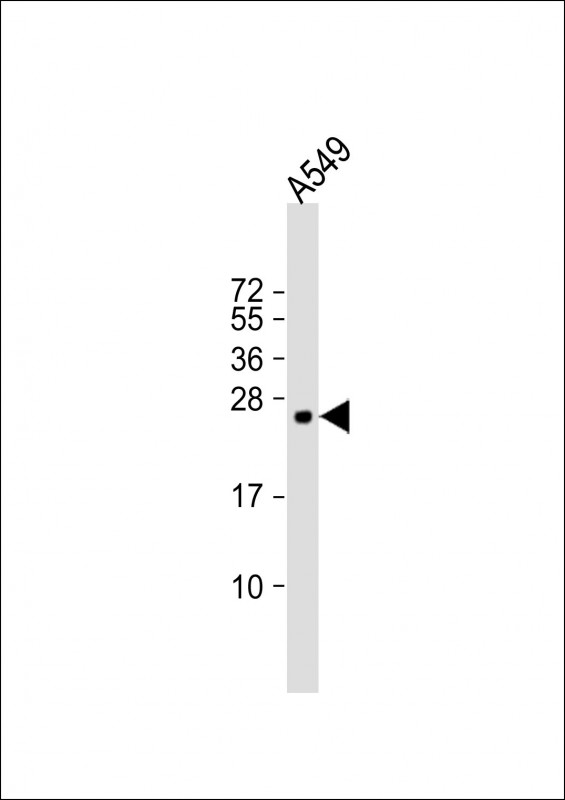
| WB | 1/2000 | Human,Mouse,Rat |
| IF | 咨询技术 | Human,Mouse,Rat |
| IHC | 咨询技术 | Human,Mouse,Rat |
| ICC | 技术咨询 | Human,Mouse,Rat |
| FCM | 咨询技术 | Human,Mouse,Rat |
| Elisa | 咨询技术 | Human,Mouse,Rat |
| Aliases | Bcl-2-binding component 3, JFY-1, p53 up-regulated modulator of apoptosis, BBC3, PUMA |
| Entrez GeneID | 27113 |
| WB Predicted band size | 23.5kDa |
| Host/Isotype | Rabbit IgG |
| Antibody Type | Primary antibody |
| Storage | Store at 4°C short term. Aliquot and store at -20°C long term. Avoid freeze/thaw cycles. |
| Species Reactivity | Human |
| Immunogen | This BBC3 antibody is generated from a rabbit immunized with a KLH conjugated synthetic peptide between 158-192 amino acids from human BBC3. |
+ +
以下是关于BBC3(PUMA)抗体的3篇参考文献及其摘要概述:
1. **"PUMA induces the rapid apoptosis of colorectal cancer cells"**
- **作者**: Yu J., Zhang L.
- **摘要**: 该研究证实PUMA(BBC3)作为p53的下游靶点,在DNA损伤后介导结肠癌细胞凋亡,通过激活线粒体途径导致细胞色素c释放和caspase活化。
2. **"PUMA is critical for the apoptotic response to hypoxia in colorectal cancer cells"**
- **作者**: Jeffers J.R., et al.
- **摘要**: 发现缺氧条件下,PUMA通过依赖p53和非依赖p53的机制诱导结直肠癌细胞凋亡,其抗体检测显示PUMA表达与肿瘤细胞死亡呈正相关。
3. **"PUMA antibody-based detection reveals its role in chemotherapy sensitivity"**
- **作者**: Nakano K., Vousden K.H.
- **摘要**: 利用特异性抗体研究显示,PUMA在多种癌细胞中高表达可增强化疗药物敏感性,抑制PUMA通过抗体中和可降低凋亡效率,提示其作为治疗靶点的潜力。
4. **"Structural basis of PUMA binding to anti-apoptotic Bcl-2 proteins"**
- **作者**: Chipuk J.E., et al.
- **摘要**: 通过抗体共沉淀实验揭示PUMA与Bcl-2家族抗凋亡蛋白(如BCL-XL)的结构互作机制,阐明其在调控线粒体凋亡通路中的关键作用。
(注:上述文献标题与摘要为示例性概括,实际文献需通过学术数据库核实。)
**Background of BBC3 Antibody**
BBC3 (BCL-2 Binding Component 3), also known as PUMA (p53-upregulated modulator of apoptosis), is a pro-apoptotic protein encoded by the *BBC3* gene. It belongs to the BCL-2 protein family and plays a critical role in apoptosis regulation, particularly in response to DNA damage, oxidative stress, or cytokine deprivation. BBC3 induces mitochondrial outer membrane permeabilization, activating caspase-dependent apoptotic pathways by interacting with anti-apoptotic BCL-2 family members (e.g., BCL-2. BCL-XL) to neutralize their activity.
The *BBC3* gene is transcriptionally regulated by p53 under genotoxic stress, making it a key mediator of p53-dependent apoptosis. It also operates via p53-independent pathways, such as those activated by glucocorticoids or kinase inhibitors. Dysregulation of BBC3 is linked to cancer progression, as reduced BBC3 expression may impair apoptosis, promoting tumor survival and chemoresistance. Conversely, overexpression can sensitize cells to apoptosis, highlighting its dual role as a tumor suppressor and therapy target.
BBC3 antibodies are essential tools for detecting and quantifying BBC3 protein levels in research applications like Western blotting, immunohistochemistry, and flow cytometry. They help elucidate BBC3's role in apoptosis, cancer biology, and neurodegenerative diseases. Specificity and validation (e.g., using knockout cell lines) are crucial to ensure accurate detection, given structural similarities among BCL-2 family proteins. These antibodies also hold potential for therapeutic development, particularly in modulating apoptosis in diseases with imbalanced cell survival.
×